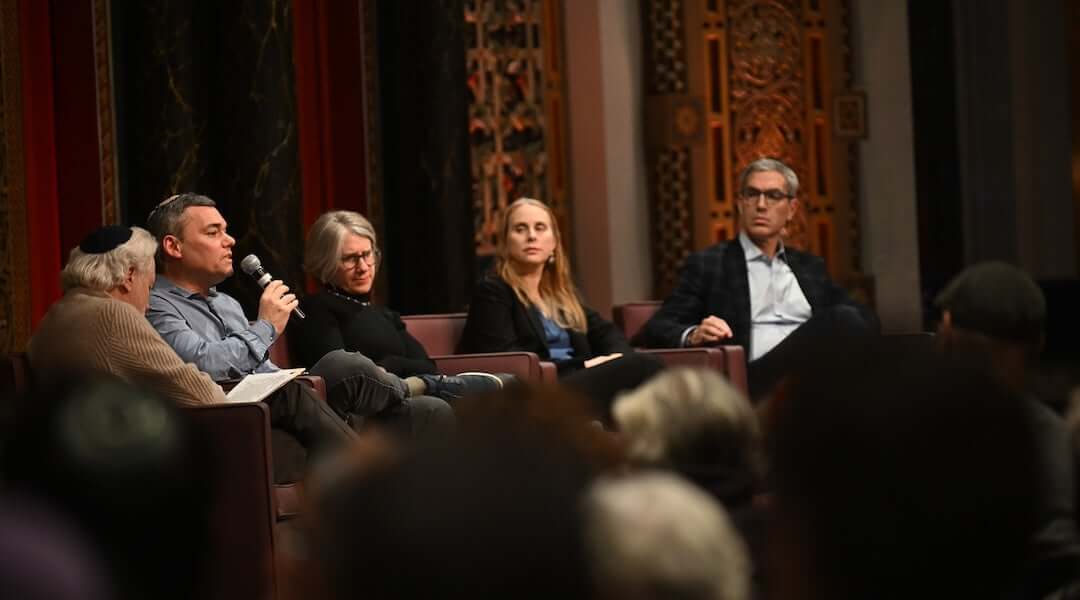Donald Trump is Losing Jewish Donors and Intellectuals, But Will it Impact His Bottom Line?

Image by Getty Images
Donald Trump may have the full support of Jewish mega-donor Sheldon Adelson, along with his reported pledge of $100 million, but the New York billionaire might sorely miss several other Jewish Republican donors turned off by his views on immigration and minorities and his choice of words and tone.
As the general election heats up, most Jewish GOP funders are already accounted for, and some of the major donors who have brought in six-figure contributions in previous election cycles are out of the game: either they’ve denounced Trump on the record, or they’re not willing to commit to supporting him. In either case, they have no intention of sharing their wealth with Trump in his effort to win the presidency.
Could the lack of Jewish donor solidarity with Trump make a dent on the presumptive nominee’s campaign? “Yes, if he cared,” said presidential historian and former White House aide Tevi Troy, “but he does not put the same emphasis on fundraising as previous candidates.”
Nor does he court the conservative Jewish elite the way other candidates have. Some of the Jewish community’s most prominent conservative voices have rejected Trump. He recently even lost the support of Rabbi Shmuley Boteach, an outspoken critic of the Obama administration who previously spoke enthusiastically about Trump, and is now on the fence. The campaign will reveal whether reduced Jewish financial and political support will matter, or whether Trump has rewritten these rules as he has others.
While Jewish Republicans are still a minority within the community, they play an outsized role in GOP politics by virtue of their sizable financial contributions to candidates and by their prominence in the ranks of conservative intellectual elites. Both these groups, this time around, are finding it hard to coalesce behind the Republican candidate.
One of them is Paul Singer, a New York hedge fund manager who has given an estimated $17 million in the past 25 years to Republican campaigns.
A harsh critic of Trump from the start, Singer supported Trump’s rivals during the primary season and recently announced he will not contribute to the upcoming Republican convention, set to begin July 18 in Cleveland. In past election cycles, Singer has given significant donations to the costly party event, reaching $1 million in 2012 and $500,000 in 2008. He’s also hosted top donor events on the convention sidelines.
Another major donor who will not write checks to Trump’s campaign is Bruce Kovner, a New York financier worth more than $5 billion. Kovner donated $3 million to Republican candidates since the last election cycle but Trump will not enjoy his largesse. “His boorish behavior throughout the campaign suggested to me that he did not have the character to be president,” Kovner said of Trump, explaining to the New York Times his reservation from the candidate.
The same goes for Jewish billionaire Seth Klarman, a reliable Republican donor who had given an estimated $5.5 million to GOP candidates in recent years. Klarman has announced that he will neither fund Trump nor vote for him.
Florida auto dealer Norman Braman, who emerged as a mega-donor last year with his massive funding for Marco Rubio’s presidential race, is also sitting this one out. Braman does support Trump and will not contribute to his campaign.
Silicon Valley software magnate Larry Ellison, who has given handily to Republican causes and has contributed millions to Rubio’s campaign, also intends to keep his mega-donations away from Trump this year.
Taken together, the loss of top Jewish donors could easily cost Trump $10-20 million in campaign contributions and Super PAC support, not to mention the bundling and networking power these donors will not be sharing with the campaign. In addition, said a Jewish Republican insider who asked not to be named because of his current affiliation, mega donors refusing to contribute to their party’s candidate could have a broader impact. “It says to donors that it’s okay not to support your candidates,” he said, noting that the ripple effect influence other funders.
Of course, Trump still has many Jewish Republican heavyweights on his side. Adelson, if he will indeed live up to his promise of providing $100 million, will maintain the same support level of 2012. Trump has also enlisted other Jewish mega-donors including Bernie Marcus, Sam Fox, Elliott Broidy, Mel Sembler and Ron Weiser.
But the anti-Trump camp also includes some of the most prominent Jewish conservative voices. Most distanced themselves from Trump early on and have since refused to back him even after he won the nomination. Leading this pack is Weekly Standard editor Bill Kristol, who is joined by other Republican Jewish thinkers such as Charles Krauthammer, Dan Senor, Jonah Goldberg and Jennifer Rubin, and former RNC chair Ken Mehlman.
“Since the 1960s, the work of Jewish intellectuals was part of the Republican Party’s broad appeal to all American conservatives,” said former George W. Bush adviser Noam Neusner. “The fact that Jewish intellectuals can’t or won’t favor the candidacy of Mr. trump will leave a gaping hole not just in his appeal to Jews but in his appeal to all conservatives.”
Troy, who also worked for the Bush White House and is the author of the forthcoming “Shall We Wake the President? Two Hundred Years of Disaster Management from the Oval Office,” noted that while Jewish intelligentsia used to represent the spirit of the party and of the Jewish community, “what happened this year is that there is a disconnect between GOP elites, Jews and non-Jews, and the GOP electorate.”
Contact Nathan Guttman at [email protected] or on Twitter @nathanguttman














